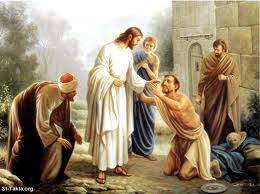HOMILY WEEK 01 – 03
Doing the Will of God:
(1 Sam 3:1-20; Ps 40; Mk 1:29-39)
*********************************
There are many Markan characteristics in this gospel: Jesus goes out of the synagogue; he takes four disciples with him; he goes into a home; he heals Peter’s mother-in-law; he exercises power over evil spirits, then he moves on and does not stay there.
The first part of Mark’s gospel is like a prologue – it indicates what is to follow in the rest of the gospel.
 What Jesus is doing is the will of the Father, which builds on the first reading in which Samuel is ready to do the will of God. Jesus does not do the expected; he does not stay where he is popular and doing great work, but rather moves on into the unexpected and unknown, all part of doing the will of the Father.
What Jesus is doing is the will of the Father, which builds on the first reading in which Samuel is ready to do the will of God. Jesus does not do the expected; he does not stay where he is popular and doing great work, but rather moves on into the unexpected and unknown, all part of doing the will of the Father.
What is the will of God? For us it won’t be hearing the voice of God as Samuel did. In fact, the will of God is not so much doing certain actions, as it is an attitude and an orientation.
It is an attitude of discernment. Discernment is not so much making a decision, as having a discerning attitude towards the future. We take a step now towards trusting in the fidelity of God in the future. Doing the will of God is trusting in God and acting on that trust that God will be faithful to us always. Jesus did the will of God by trusting in the Father’s love.
The calling of Samuel reminds us that we aren’t alone in our efforts to understand God’s call. God give us brothers and sisters in Christ who can use their different gifts to help us hear and accept it. That means that none of us individually needs to try and discern God’s will for our lives on our own. God has united us as a body of believers, some of whom are meant to accompany and guide us on our faith journey. The Lord works through these friends and spiritual directors, and confessors helping us to “see” so that we can know and follow his will for every season of our lives. I know that I partially owe my vocation to priesthood and the episcopacy to a French professor at the university who, out of the blue, point-blank asked me after one class if I had ever thought of being a priest! That told me God was still calling me, only now in a more audible way.
Doing the will of God is also to be revelatory. Love is always revelatory. We are to be images of God here on earth; members of Jesus’ Body, revealing the Father’s love to all. To do the will of God is to be humble, loving, Christ-like in all we think, say and do. Jesus moved from mystery to history; we in a sense move from history into mystery, the mystery of God’s love for us that we are to manifest to the world.
The Eucharist is a ritual that is truly doing the will of God – listening to God’s Word like Samuel; discerning God’s presence in humble gifts that reveal God’s love for us and share that love with us, and then missioning us to go out and reveal that love of God to the world.



